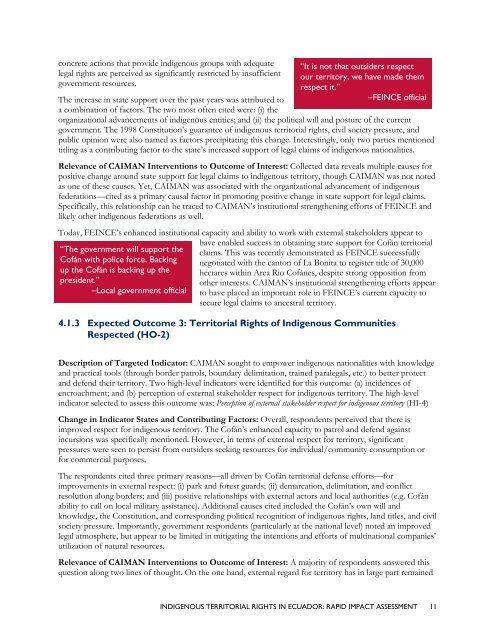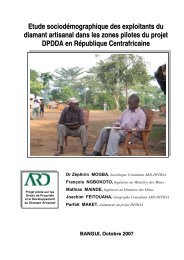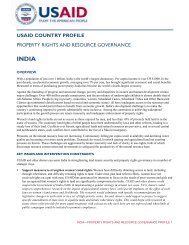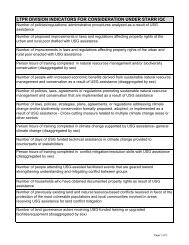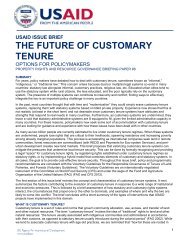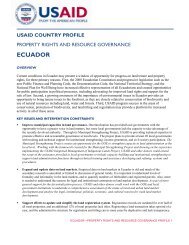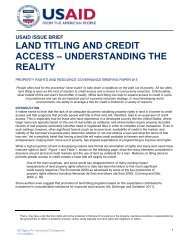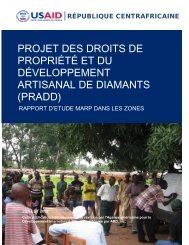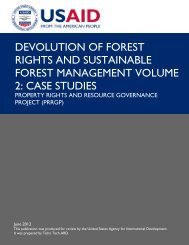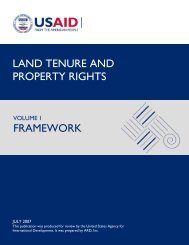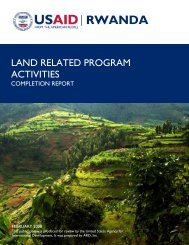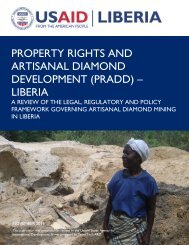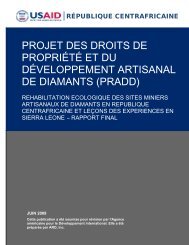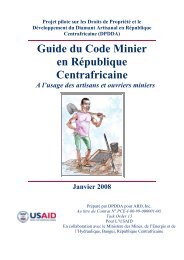ECUADOR - Land Tenure and Property Rights Portal
ECUADOR - Land Tenure and Property Rights Portal
ECUADOR - Land Tenure and Property Rights Portal
- No tags were found...
You also want an ePaper? Increase the reach of your titles
YUMPU automatically turns print PDFs into web optimized ePapers that Google loves.
concrete actions that provide indigenous groups with adequatelegal rights are perceived as significantly restricted by insufficientgovernment resources.“It is not that outsiders respectour territory, we have made themrespect it.”–FEINCE officialThe increase in state support over the past years was attributed toa combination of factors. The two most often cited were: (i) theorganizational advancements of indigenous entities; <strong>and</strong> (ii) the political will <strong>and</strong> posture of the currentgovernment. The 1998 Constitution’s guarantee of indigenous territorial rights, civil society pressure, <strong>and</strong>public opinion were also named as factors precipitating this change. Interestingly, only two parties mentionedtitling as a contributing factor to the state’s increased support of legal claims of indigenous nationalities.Relevance of CAIMAN Interventions to Outcome of Interest: Collected data reveals multiple causes forpositive change around state support for legal claims to indigenous territory, though CAIMAN was not notedas one of these causes. Yet, CAIMAN was associated with the organizational advancement of indigenousfederations—cited as a primary causal factor in promoting positive change in state support for legal claims.Specifically, this relationship can be traced to CAIMAN’s institutional strengthening efforts of FEINCE <strong>and</strong>likely other indigenous federations as well.Today, FEINCE’s enhanced institutional capacity <strong>and</strong> ability to work with external stakeholders appear tohave enabled success in obtaining state support for Cofán territorial“The government will support the claims. This was recently demonstrated as FEINCE successfullyCofán with police force. Backing negotiated with the canton of La Bonita to register title of 30,000up the Cofán is backing up the hectares within Area Rio Cofánes, despite strong opposition frompresident.”other interests. CAIMAN’s institutional strengthening efforts appear–Local government official to have played an important role in FEINCE’s current capacity tosecure legal claims to ancestral territory.4.1.3 Expected Outcome 3: Territorial <strong>Rights</strong> of Indigenous CommunitiesRespected (HO-2)Description of Targeted Indicator: CAIMAN sought to empower indigenous nationalities with knowledge<strong>and</strong> practical tools (through border patrols, boundary delimitation, trained paralegals, etc.) to better protect<strong>and</strong> defend their territory. Two high-level indicators were identified for this outcome: (a) incidences ofencroachment; <strong>and</strong> (b) perception of external stakeholder respect for indigenous territory. The high-levelindicator selected to assess this outcome was: Perception of external stakeholder respect for indigenous territory (HI-4)Change in Indicator States <strong>and</strong> Contributing Factors: Overall, respondents perceived that there isimproved respect for indigenous territory. The Cofán’s enhanced capacity to patrol <strong>and</strong> defend againstincursions was specifically mentioned. However, in terms of external respect for territory, significantpressures were seen to persist from outsiders seeking resources for individual/community consumption orfor commercial purposes.The respondents cited three primary reasons––all driven by Cofán territorial defense efforts—forimprovements in external respect: (i) park <strong>and</strong> forest guards; (ii) demarcation, delimitation, <strong>and</strong> conflictresolution along borders; <strong>and</strong> (iii) positive relationships with external actors <strong>and</strong> local authorities (e.g. Cofánability to call on local military assistance). Additional causes cited included the Cofán’s own will <strong>and</strong>knowledge, the Constitution, <strong>and</strong> corresponding political recognition of indigenous rights, l<strong>and</strong> titles, <strong>and</strong> civilsociety pressure. Importantly, government respondents (particularly at the national level) noted an improvedlegal atmosphere, but appear to be limited in mitigating the intentions <strong>and</strong> efforts of multinational companies’utilization of natural resources.Relevance of CAIMAN Interventions to Outcome of Interest: A majority of respondents answered thisquestion along two lines of thought. On the one h<strong>and</strong>, external regard for territory has in large part remainedINDIGENOUS TERRITORIAL RIGHTS IN <strong>ECUADOR</strong>: RAPID IMPACT ASSESSMENT 11


